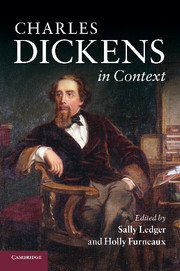Book contents
- Frontmatter
- Contents
- List of illustrations
- Notes on contributors
- Preface
- Notes on references
- PART I LIFE AND AFTERLIFE
- 1 The life of Dickens 1: before Ellen Ternan
- 2 The life of Dickens 2: after Ellen Ternan
- 3 Dickens's lives
- 4 Victorian stage adaptations and novel appropriations
- 5 Reviewing Dickens in the Victorian periodical press
- 6 The European context
- 7 Major twentieth-century critical responses
- 8 Modern stage adaptations
- 9 Modern screen adaptations
- 10 The heritage industry
- 11 Neo-Victorian Dickens
- PART II SOCIAL AND CULTURAL CONTEXTS
- Further reading
- Index
1 - The life of Dickens 1: before Ellen Ternan
Published online by Cambridge University Press: 05 August 2012
- Frontmatter
- Contents
- List of illustrations
- Notes on contributors
- Preface
- Notes on references
- PART I LIFE AND AFTERLIFE
- 1 The life of Dickens 1: before Ellen Ternan
- 2 The life of Dickens 2: after Ellen Ternan
- 3 Dickens's lives
- 4 Victorian stage adaptations and novel appropriations
- 5 Reviewing Dickens in the Victorian periodical press
- 6 The European context
- 7 Major twentieth-century critical responses
- 8 Modern stage adaptations
- 9 Modern screen adaptations
- 10 The heritage industry
- 11 Neo-Victorian Dickens
- PART II SOCIAL AND CULTURAL CONTEXTS
- Further reading
- Index
Summary
Charles Dickens lived for fifty-eight years, about the average lifespan for the period, but there is little else ordinary or typical about his life, which witnessed unprecedented social, technological and political changes as dramatic as his own transformation from shrieking infant to world-renowned man of letters. His birthplace still stands in an attractive little terrace in Portsmouth, then on the main road to London, a modest house like thousands of others recently built at the fag end of the Napoleonic wars. Within a few months the family had moved, the beginning of a peripatetic childhood which saw fourteen changes of address in as many years. Some of these moves are likely to have been flits, so his father (John Dickens, 1785–1851) could avoid paying the rent or rates. It could, perhaps should, have been a secure childhood in an insecure time, as his father had a responsible post with steady career progression, beginning as ‘a five-shilling-a-day 15th assistant Clerk’ to the Navy Pay Office and retiring twenty years later as a ‘£350-a-year Clerk of the 3rd class’. The Dickens family were not rich by any means, but they should have managed to avoid the desperate poverty and exploitation that was common around them. It was a lower middle-class childhood, a world not too far from want but with aspirations to the dignities and pleasures of the genteel, a terrain that Dickens's fiction would make his own.
- Type
- Chapter
- Information
- Charles Dickens in Context , pp. 3 - 10Publisher: Cambridge University PressPrint publication year: 2011
- 2
- Cited by



